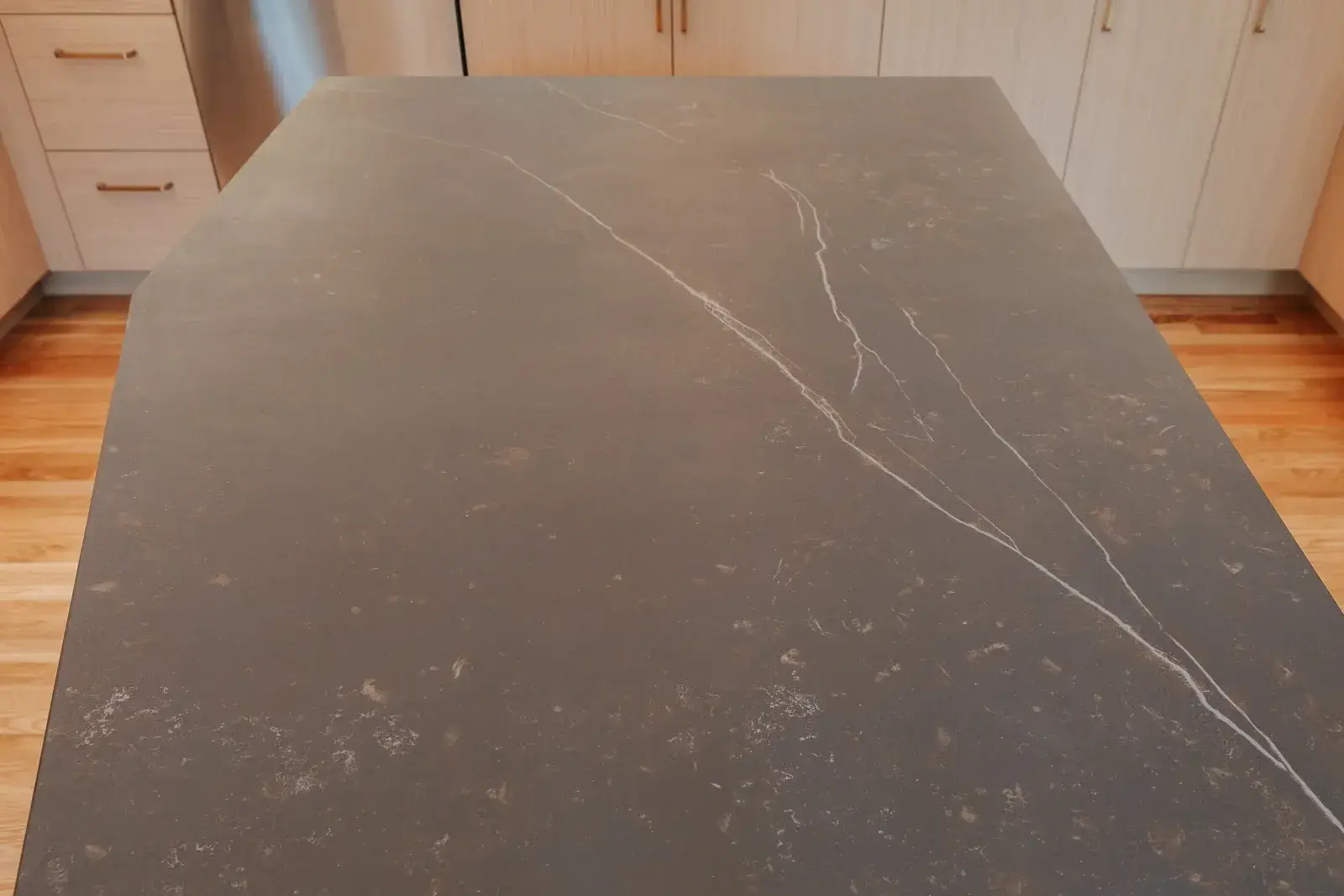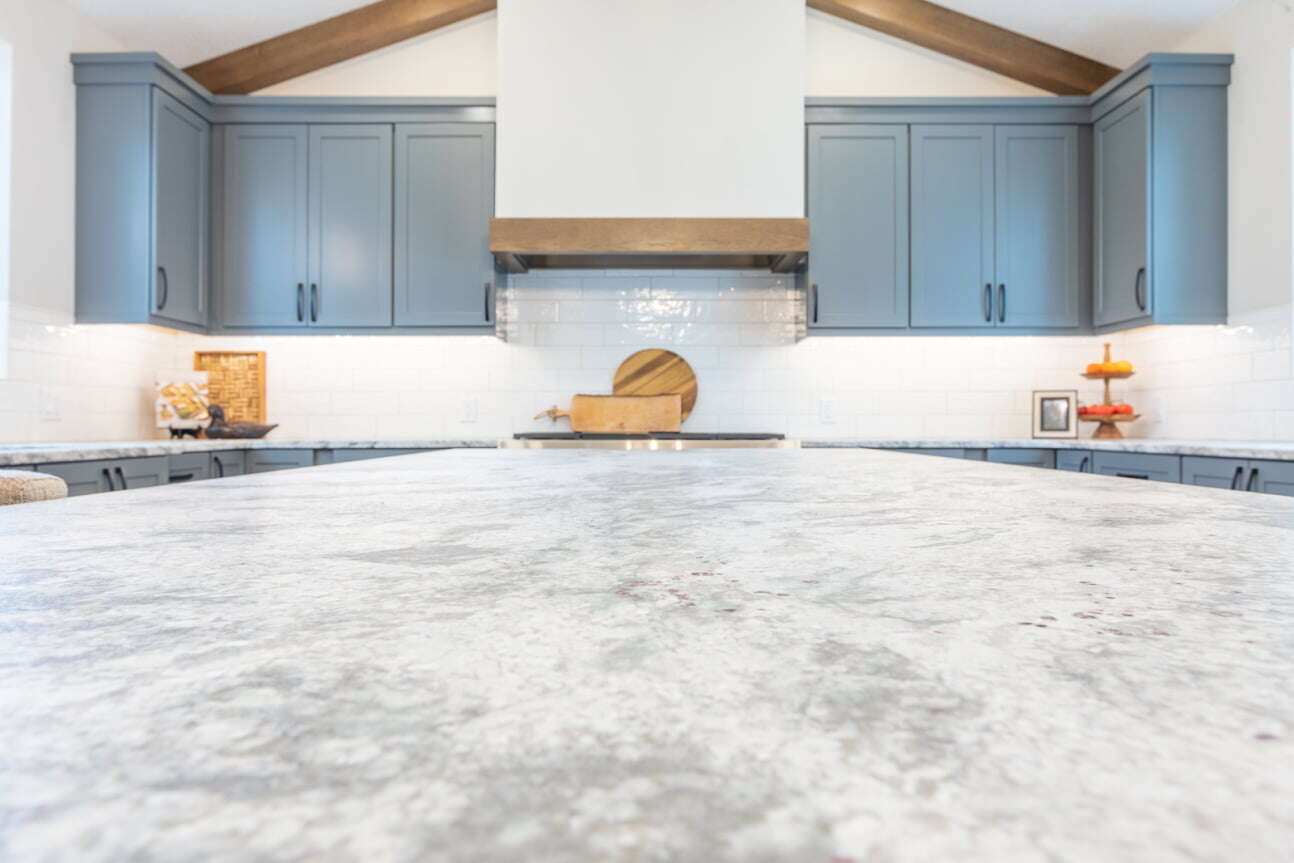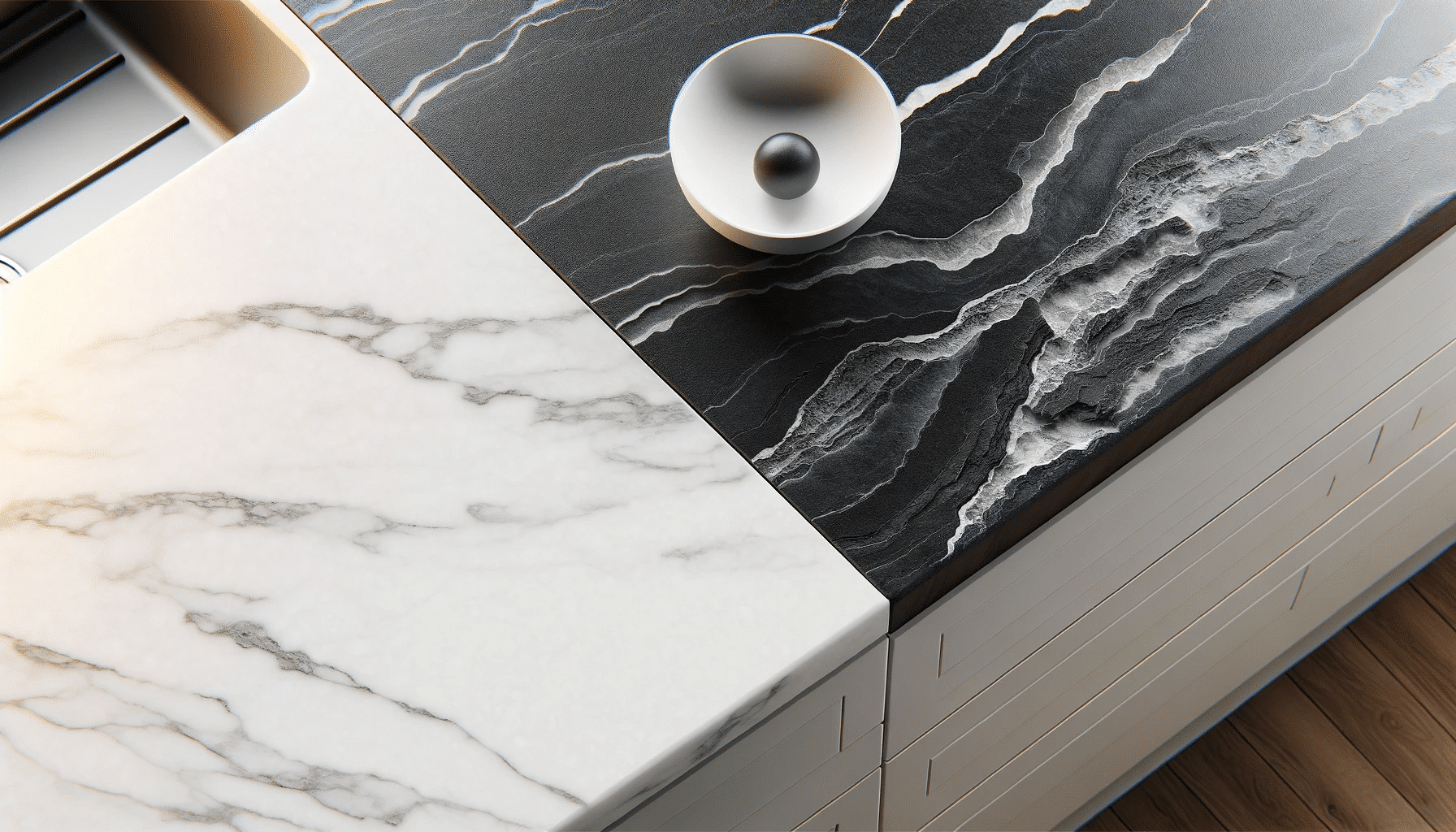Are you struggling to find a countertop material that balances aesthetics, durability, and low maintenance? Known for its balance between strength, durability, and visual appeal, Dekton countertops have grown in popularity in recent years. While Dekton is a great product that works well for the needs of most homeowners, like any product, it comes with its strengths and weaknesses. In this honest product review, let’s explore everything you need to know about Dekton countertops.
At Lamont Bros. Design & Construction, our team performs dozens of kitchen remodels every year. For many of our clients, Dekton sintered stone countertops have been a fantastic addition to their kitchen remodel. Having designed and installed Dekton countertops into several of our projects, we understand the ins and outs of working with Dekton, and what it might mean for your home.
In this review, you’ll learn about the unique composition of Dekton, its pros and cons, and whether it suits your kitchen needs. After reading, you’ll know more about what Dekton is and why so many homeowners are considering this countertop material for their kitchens. With that information, you’ll be able to make an informed decision on whether or not Dekton is right for you. The specific topics we’ll discuss include:
- What are Dekton Countertops Made of?
- Pros & Cons of Dekton Countertops
- Are Dekton Countertops Right for Me?
What Are Dekton Countertops Made Of?
Dekton is the brand name of Cosentino’s sintered stone countertop line. Sintered stone is an engineered (man-made) material created through a process called sintering. This process involves combining a mixture of natural minerals, such as quartz, porcelain, and glass, and then subjecting this mixture to extreme heat and pressure.
This process mimics the natural formation of stone over thousands of years but compresses it into a much shorter timeframe. The result is a dense, durable, and non-porous surface that is resistant to heat, scratches, and stains.
While there are other brands of sintered stone countertops, Dekton is by far the most well-known and highly regarded.
Pros and Cons of Dekton Countertops
Before deciding whether Dekton countertops are right for your home, it’s important to weigh their advantages and disadvantages. Here’s a detailed look at both sides.
Pros of Dekton Countertops
Homeowners often prefer Dekton for its long-term durability and overall resistance to various forms of damage. It requires very little maintenance, and is a great option for large kitchens that need a consistent slab pattern throughout.
Extremely Durable Once Installed
Dekton countertops are renowned for their durability. Thanks to the sintering process, these countertops possess a flexural strength of 5 times that of natural stone. They can withstand the wear and tear of daily kitchen activities without showing signs of aging or damage.
Due to its exceptional durability, Dekton comes with a 25-year warranty. However, this warranty is only valid if the countertops are installed by a certified Dekton installer.
Heat, Scratch, & Stain Resistant
One of the standout features of Dekton is its resistance to heat, scratches, and stains. In fact, Dekton is the only countertop material that advertises as safe for hot pots and pans directly on the surface.
In terms of scratch resistance, Dekton scores an 8 on the Mohs hardness scale, well above granite’s 6.5. Because of this, you don’t have to be overly cautious with knives or other sharp objects. Additionally, its non-porous nature ensures that spills and stains do not penetrate the surface, making cleaning and maintenance much easier.
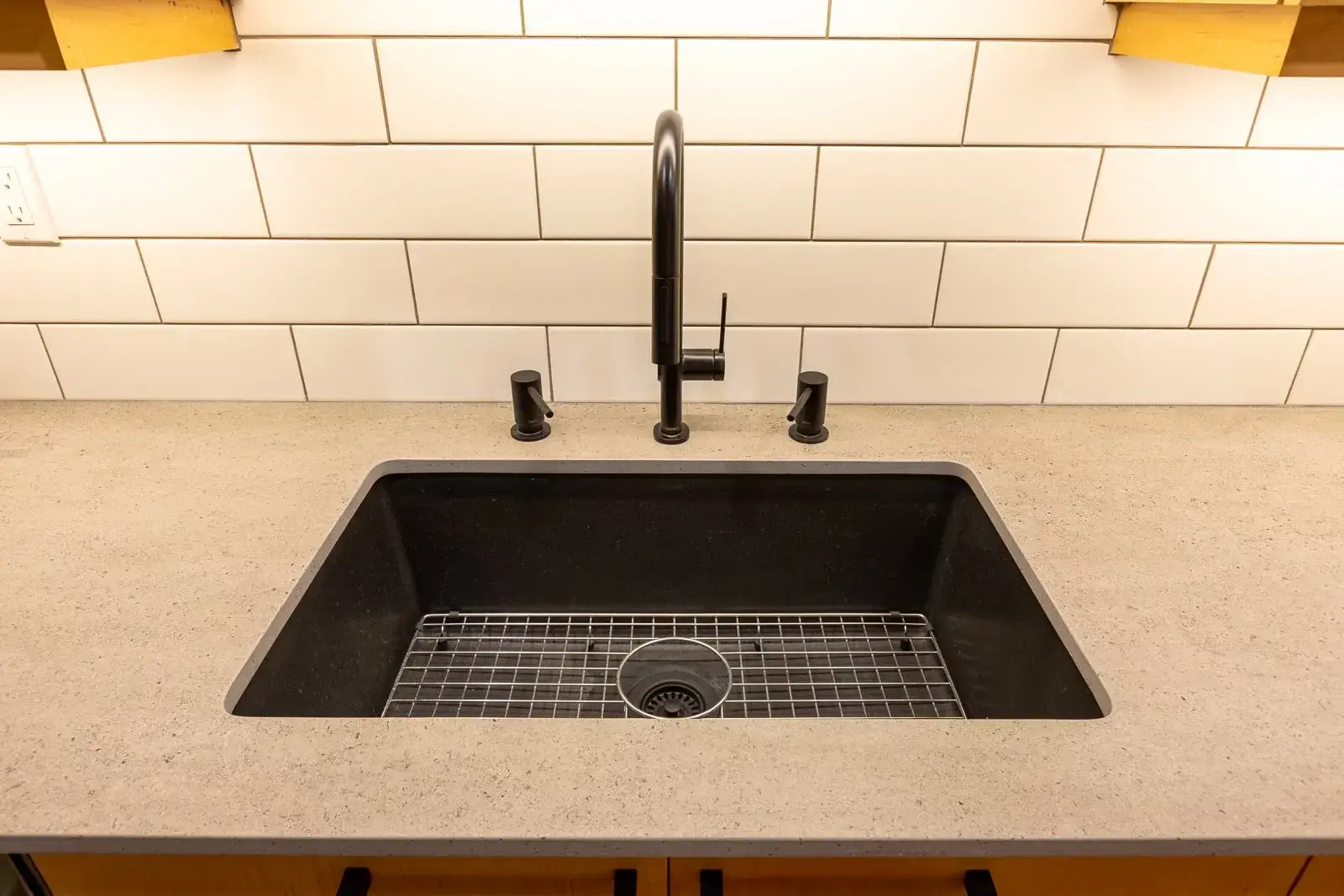
Low Maintenance
Unlike natural stone countertops that require regular sealing and special cleaners, Dekton surfaces are entirely maintenance-free. A simple wipe with a damp cloth is usually enough to keep them looking new.
This low-maintenance advantage is particularly appealing to busy homeowners who want a hassle-free countertop.
Consistent Quality & Visual Patterns
Because Dekton is an engineered surface, it offers a consistent patterning and appearance that natural stone often lacks.
You can choose from a wide variety of colors and patterns, all of which will be uniform throughout the slab. This consistency can be particularly beneficial in larger kitchens that require multiple slabs with matching veining and coloration.
Cons of Dekton Countertops
Although Dekton is a high-performance countertop material with several great features, it does present a few challenges. Its high cost, complex installation, and brittle nature all serve as reasons why some people choose not to go with Dekton.
High Initial Cost
One of the main drawbacks of Dekton countertops is their high initial cost. The advanced manufacturing process and the high-quality raw materials contribute to a higher price point compared to other countertops.
We’ve seen Dekton countertops cost homeowners over $12,000 — and that’s without installation or labor costs. However, many homeowners find that the long-term benefits and durability justify the initial investment.
Brittle If Not Installed Correctly
While Dekton is extremely durable once installed, it can be brittle and prone to chipping or cracking during installation if not handled properly.
Anecdotally, our team has seen Dekton slabs crack or shatter due to heavy impact prior to installation. We’ve also talked with homeowners whose Dekton countertops cracked after dropping something on the surface. The cause of this was later found to be improper installation.
No Patterning on Edges
Another aesthetic limitation of Dekton is that the patterning or veining is only on the surface and doesn’t extend through the edges of the countertop. This means that the edges will have a different appearance compared to the surface, which might not be ideal for those seeking a more consistent look.
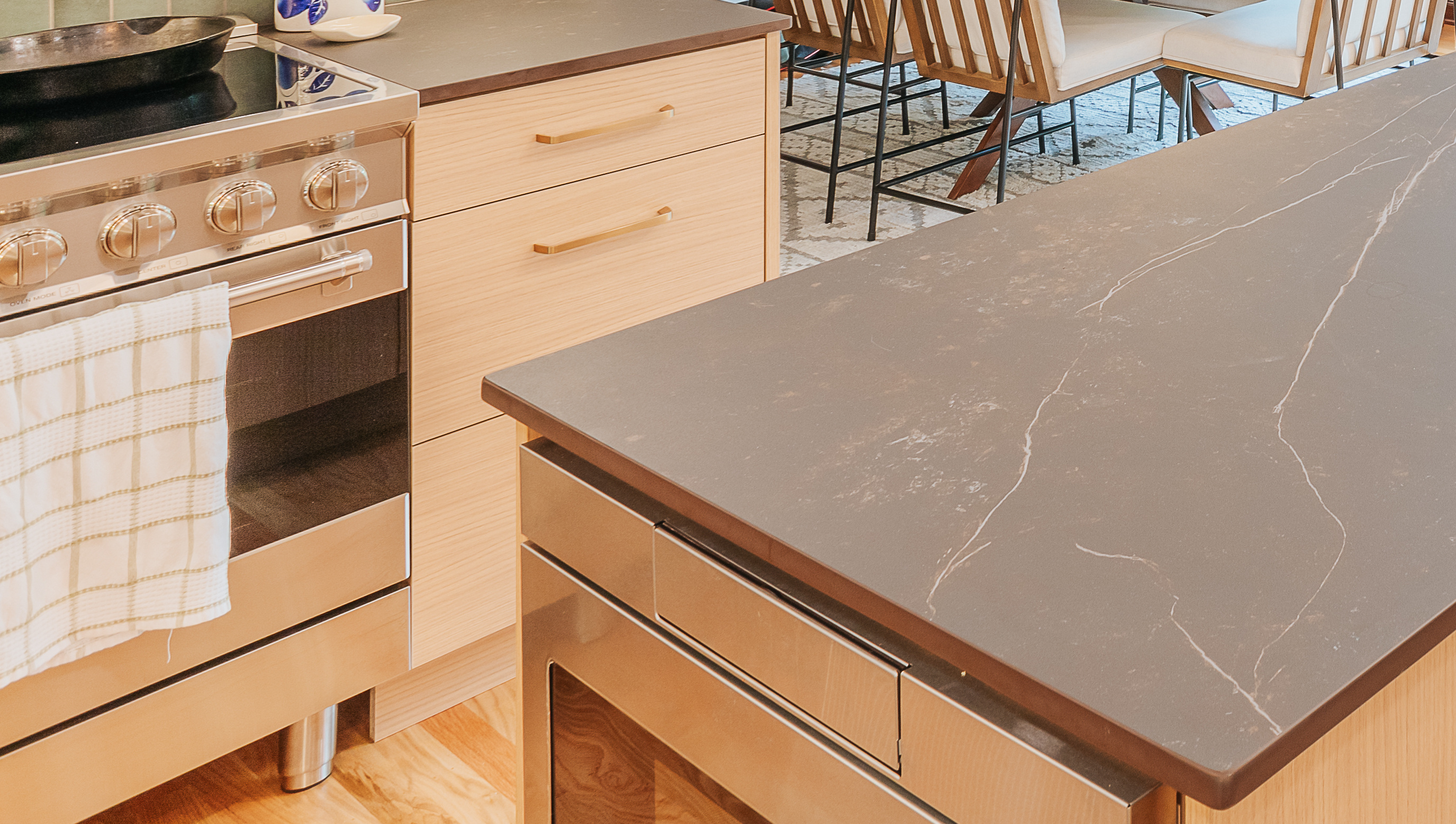
Relatively New to the Market
Dekton is a relatively new product in the countertop market, which means there is less long-term data available about its performance compared to materials like granite or quartz. While initial feedback is largely positive, some homeowners might prefer to wait until more long-term product studies become available.
Are Dekton Countertops Right For You?
Deciding whether Dekton countertops are the right choice for your home depends on your specific needs, preferences, and budget. Here are some scenarios to help you determine if Dekton is a good fit for you.
Dekton is a Great Option for You if…
You Don’t Mind Paying a Premium Price for Longevity and Durability
If you’re willing to invest in a high-quality countertop that will last for years without showing signs of wear and tear, Dekton is an excellent choice. Its durability and low maintenance make it a cost-effective option in the long run.
You Don’t Want a Countertop That Requires Constant Maintenance
For homeowners who prefer minimal upkeep on their countertops, Dekton’s low maintenance requirements are a significant advantage. You won’t need to worry about regular sealing or using special cleaners, making it a convenient option for homeowners with busy lifestyles.
You Want a Wide Range of Styles and Thickness Options
Dekton offers a variety of styles, colors, and thickness options, allowing you to customize your countertops to match your aesthetic preferences and design needs. Whether you’re looking for a sleek, modern look or a more traditional appearance, Dekton has options to suit your taste.
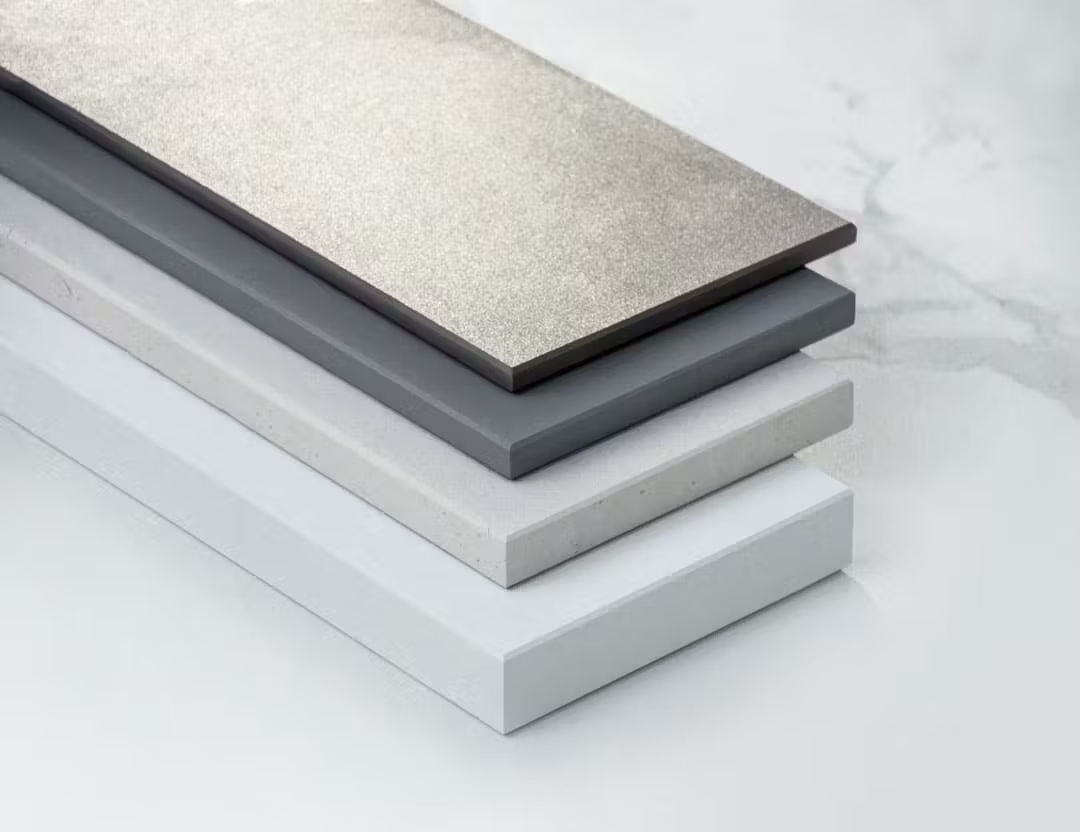
Dekton Might Not Be The Best Option For You If…
Your Main Priority is To Keep Costs Low
If budget is your primary concern, Dekton might not be the best option due to its higher initial cost. There are other countertop materials, such as engineered quartz, that might be more affordable while still offering good performance.
Continuous Patterning Through the Countertop Edge is Important to You
For those who desire a continuous pattern throughout the surface and edges of their countertops, Dekton might not meet this aesthetic requirement. The lack of patterning on the edges can be a deal-breaker for some design-focused homeowners.
You Want a Countertop With an Authentic Natural Stone Look
While Dekton does a pretty good job of mimicking the natural colors and vein patterns of granite or marble, its visuals are not a replacement for the real thing. If you want a countertop that offers the stunning aesthetic of natural stone and are willing to deal with more maintenance, a natural stone countertop might be your best option.
Want to Learn More About Kitchen Remodeling?
After reading this article, do you feel more confident deciding if Dekton countertops are right for your kitchen? As you continue your journey towards transforming your kitchen, take the next step in your research. Download our free Kitchen Remodel Buyer’s Guide, where you’ll find everything you need to know before starting a kitchen remodel.
Ready to start remodeling, but don’t want to face the challenge of transforming your kitchen alone? If so, click the button below to schedule a free design consultation with a member of our team. We’ll help you plan your remodel so it’s smooth sailing from the start.
